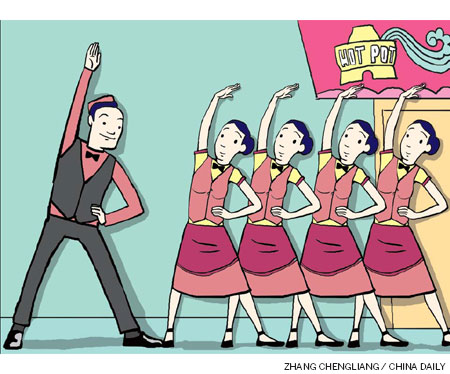Comment
Don't get out of step with employee bonding rituals
By Fred Yang (China Daily)
Updated: 2010-08-26 09:35
 |
Large Medium Small |

Vigorous rhythms and upbeat music blared out, filling the streets in the neighborhood. It was 4 pm, way too early for a nightclub to start business. As I wondered where it came from and looked around, an array of youngsters sprung into view.
One did not have to be smart to tell from their uniforms that they were a bunch of waiters and waitresses undergoing a typical military-like drilling, a widely adopted by Chinese restaurant owners nowadays to pump up the morale of their employees before going into the overwhelming night shift.
As my friend and I approached, they finished their aerobic dance routine and sat upright to listen to the pep rally boomed out by a head waiter.
"It's an exploitation of labor," my friend burst out with indignation, saying it would be an over-my-dead-body case for him if he was asked to go through the same thing, since it was so embarrassing to wave your hands and shake your hips like that in front of the public.
"The waiters should demand twice as much wages, because they have doubled their roles and become clowns in a circus," he went on sarcastically.
Is the life of those service providers really as miserable as my friend says it is? My earlier experiences with several restaurants told another story.
Like other metropolitans, dining out constitutes a perennially favorite part of my live. Apart from the food and all the social functions affixed to the dining table, people are getting more and more attracted by the service offered by restaurants. We don't usually pay much attention to the service if it is mediocre, but when it's excellent or terrible it leaps out at us and impacts our dining mood - either whetting our appetite or ruining it.
One of my favorite Yunnan (China's southwest province) hotpot restaurants also has its employees doing a pep rally every day, but I could see no vestige of self-pity or resentment in them, and the out-of-the-world service is the best testament.
From the moment we enter, the front staff will solicitously hail us and courteously escort us to a table. Then, we are handed over to a trained waiter, who will stand nearby throughout the sitting. He unfailingly puts food into the boiling pot, dispenses them when it's done, ladles out mushroom soup into our bowls, changes the used utensils with clean ones, practically going through the whole nine yards of royal treatment. They even go to the trouble of improvising a choir on demand, belting out the local songs of the minority groups on some special occasions such as a guest's birthday.
Their complementary service makes for a delightful dining experience.
One day, a girl we knew happily took charge of us once she recognized us, even though it was not her shift.
"Why are you back so early?" I asked in amazement.
"I love working here and hanging out with my colleagues," she replied.
"I've had enough rest and don't have other stuff to do, so I came back to see if there's anything I can help out with."
The girl earnestly told me the boss treated them very well, arranging various activities to diversify the routine and all her colleagues were like a family.
Now looking back, as I marvel at the wonderful job the boss did of managing the employees, it is apparent that the drilling, as part of the life-spicing package, has been carried out not just for commercial purpose but for the staff's benefit as well.
Actually, the two are inextricably dependent on each other. The waiters and waitress can't possibly go through what my friend felt in his head, because it could trigger depression and grievance, which could easily be transmitted to us, the clients.
In China, the no-tip-for-service system fails to provide an effective incentive in motivating waiters to do their best and therefore the drilling comes up as a distinctly Chinese-flavored alternative.
It endears the boss to the employees because it is a nice gesture that can be readily construed by the employees as care.
Also, it offers a space for those people to bond, forget for a while the hard work they've been through, and recharge, all of which are conducive to a successful business mode.
True, we cannot rule out this arrangement might be done out that of the owners' desire to put up an effortless live advertising show, but it does encourage and press positive working attitudes into the waiters and waitresses.
So, why not drop all the cynical and sympathetic feelings. Who said profit-driven cannot be compatible with "philanthropic" deeds. After all, it is a good stratagem and both sides win.
China Daily
(China Daily 08/26/2010)